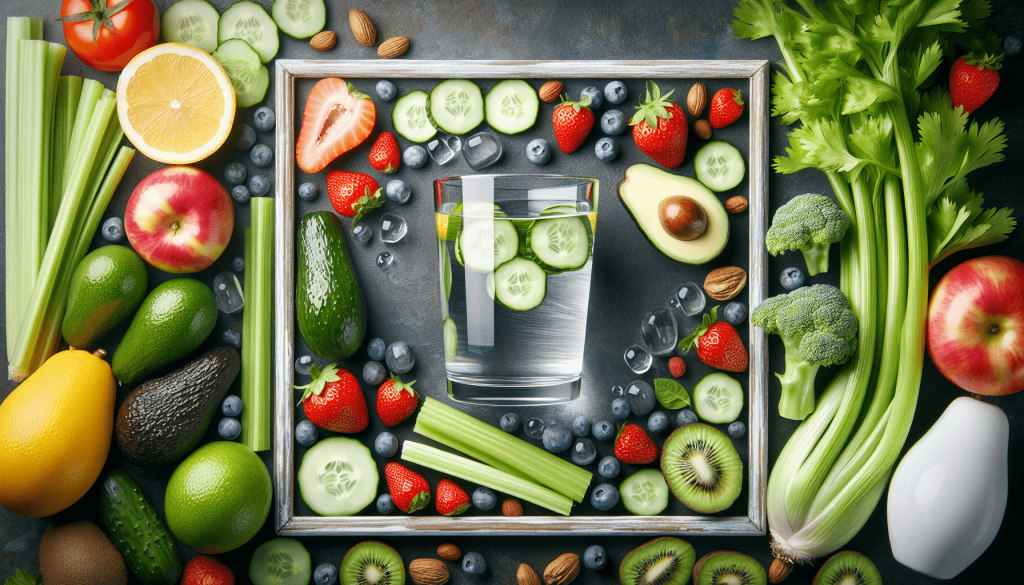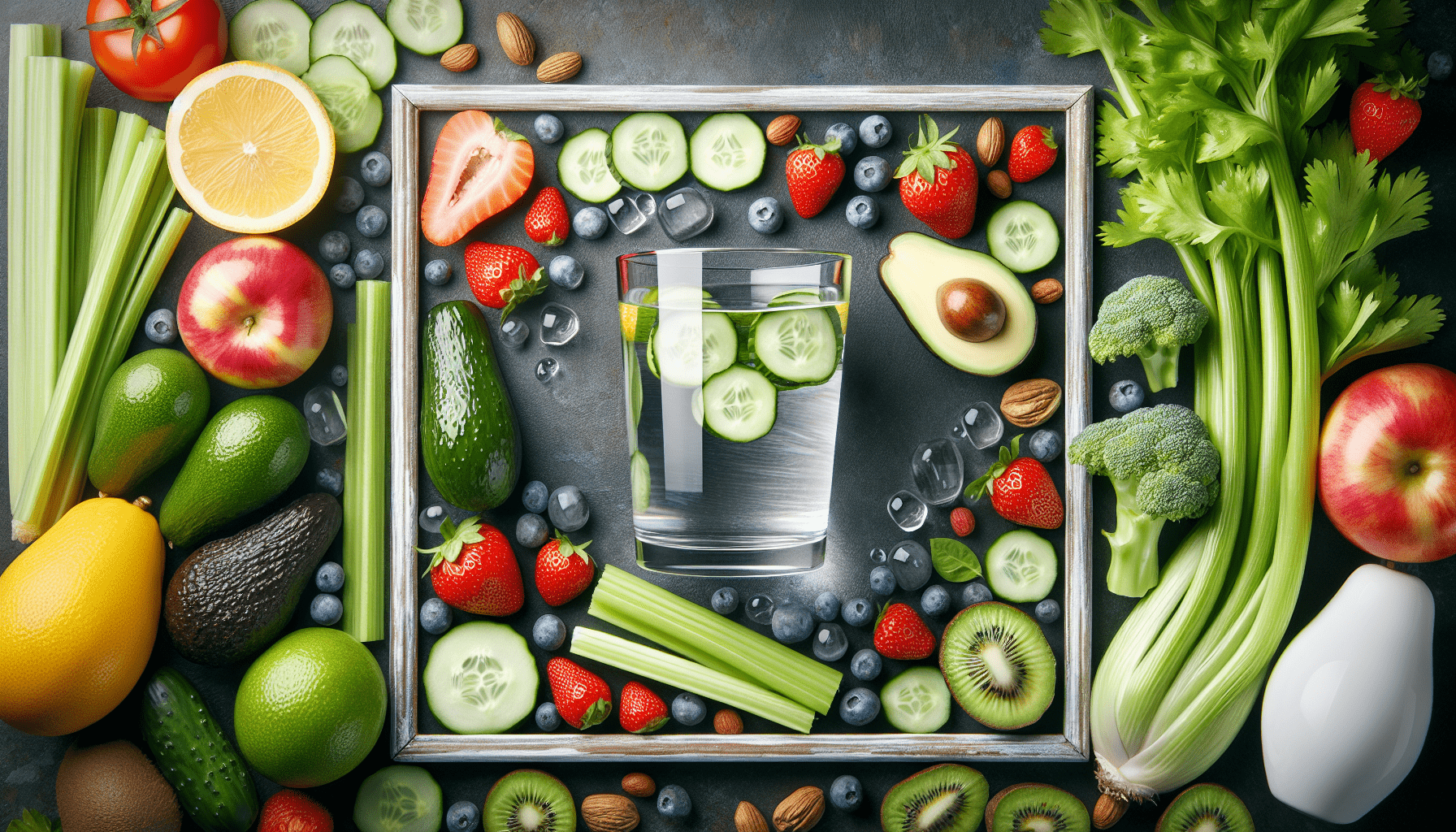You’re embarking on your keto journey, determined to achieve your health and weight loss goals. As you navigate through the world of low-carb eating, you’ve probably heard about the vital role of electrolytes in maintaining hydration. Electrolytes, such as sodium, potassium, and magnesium, are crucial for your body’s proper functioning, especially when you’re on a ketogenic diet. In this article, we’ll explore why electrolytes are so important for staying hydrated on keto and how you can ensure you’re getting the right balance to optimise your health and well-being. So, grab a glass of water and let’s dive into the key role of electrolytes in maintaining hydration on keto.

Understanding Electrolytes
What are electrolytes?
Electrolytes are minerals that have an electric charge when dissolved in a liquid such as water. They play a vital role in maintaining the balance of fluids inside and outside our cells. In the body, electrolytes help regulate muscle contractions, maintain proper nerve function, and support biochemical reactions. Examples of electrolytes include sodium, potassium, magnesium, and calcium.
Importance of electrolytes in the body
Electrolytes are essential for the proper functioning of our bodies. They help maintain the pH balance, regulate fluid levels, support nerve and muscle function, and aid in the transport of nutrients and waste products in and out of cells. Without adequate electrolyte levels, our bodies can experience imbalances that can lead to issues such as muscle cramps, fatigue, irregular heartbeat, and even more severe complications.
Examples of common electrolytes
Some common electrolytes found in the body include:
-
Sodium: Sodium plays a crucial role in maintaining fluid balance and nerve function. It is involved in regulating blood pressure and is found in foods like table salt, broth, and processed foods.
-
Potassium: Potassium is essential for proper muscle function, nerve signaling, and maintaining a healthy heart. It is found in foods like bananas, avocados, spinach, and potatoes.
-
Magnesium: Magnesium is involved in numerous biochemical reactions in the body, including energy production and protein synthesis. It can be found in foods like nuts, seeds, leafy greens, and dark chocolate.
-
Calcium: Calcium is primarily known for its role in maintaining strong bones and teeth. However, it is also involved in muscle function, nerve signaling, and blood clotting. Good dietary sources of calcium include dairy products, leafy greens, and fortified plant-based milk.
Electrolytes and Hydration
Role of electrolytes in maintaining hydration
Electrolytes play a crucial role in maintaining proper hydration within the body. When we exercise or experience high temperatures, we lose fluids through sweating. Sweat not only contains water but also electrolytes, mainly sodium and potassium. By replenishing these electrolytes, we can ensure that our bodies stay hydrated and function optimally.
How electrolytes help the body retain water
Electrolytes, especially sodium, help the body retain water through a process called osmosis. Sodium ions attract water, allowing it to be effectively absorbed and retained in the body. Without sufficient electrolyte levels, the body may struggle to retain water, leading to dehydration and its associated symptoms.
Electrolyte balance in keto diet
The ketogenic diet, or keto diet, is a low-carb, high-fat diet that has gained popularity in recent years. While the keto diet can offer numerous health benefits, including weight loss and improved cognitive function, it can also impact electrolyte balance. Since the diet restricts carbohydrates, which are a primary source of electrolytes, individuals on keto may need to pay extra attention to their electrolyte intake to prevent imbalances and promote optimal hydration.
Effects of Electrolyte Imbalance on Keto
Dehydration on keto
Dehydration can be a common issue for individuals following a keto diet. As the body adjusts to using fat as its primary fuel source, glycogen stores are depleted, resulting in a loss of water weight. This initial water loss, coupled with reduced carbohydrate intake, can lead to increased urine production and fluid loss, potentially causing dehydration. Electrolytes, particularly sodium and potassium, are crucial in helping the body retain water and prevent dehydration.
Symptoms of electrolyte imbalance
An electrolyte imbalance can manifest in various symptoms, including muscle cramps, fatigue, dizziness, irregular heartbeat, confusion, and even seizures. These symptoms occur as a result of an impaired electrical signaling system in the body, which relies on properly balanced electrolyte levels. It’s important to recognize these symptoms and take appropriate action to restore electrolyte balance.
Importance of maintaining electrolyte balance on keto
Maintaining electrolyte balance while following a keto diet is crucial for overall health and well-being. Electrolytes are necessary for maintaining fluid balance, supporting nerve and muscle function, and enabling proper biochemical reactions. By ensuring adequate electrolyte intake, individuals can prevent imbalances, promote hydration, and support their bodies in adapting to the ketogenic diet.
Sources of Electrolytes on Keto
Natural sources of electrolytes
On a keto diet, there are several natural sources of electrolytes that can be incorporated into the daily diet. These include:
-
Avocados: Avocados are a rich source of potassium and magnesium, making them an excellent choice for electrolyte replenishment on keto.
-
Leafy greens: Vegetables such as spinach, kale, and Swiss chard are not only low in carbohydrates but also provide essential electrolytes like potassium and magnesium.
-
Nuts and seeds: Almonds, walnuts, and chia seeds are good sources of electrolytes, including magnesium and potassium.
Processed sources of electrolytes
In addition to natural sources, processed foods and snacks can also provide electrolytes. However, it is essential to choose carefully, as many processed foods can be high in added sugars and unhealthy fats. Look for options such as sugar-free electrolyte drinks or beverages with added electrolytes to support hydration on a ketogenic diet.
Importance of choosing the right sources on keto
When selecting sources of electrolytes on a keto diet, it is crucial to prioritize whole foods and minimally processed options. Whole foods not only provide essential electrolytes but also offer additional nutritional benefits such as fiber and other important micronutrients. By choosing nutrient-dense sources of electrolytes, individuals can support their overall health while maintaining electrolyte balance on keto.

Common Electrolytes for Hydration on Keto
Sodium
Sodium is a vital electrolyte for hydration on a keto diet. It helps maintain fluid balance, regulates blood pressure, and supports proper nerve and muscle function. Sodium can be obtained through natural sources such as table salt, broths, and certain vegetables, or through electrolyte supplements.
Potassium
Potassium is another crucial electrolyte for hydration and muscle function. It helps maintain proper fluid balance, supports nerve impulses, and promotes healthy muscle contractions. Dietary sources of potassium include avocados, leafy greens, and nuts.
Magnesium
Magnesium is involved in numerous biochemical reactions in the body, including energy production and muscle function. It helps regulate muscle contractions, supports nerve function, and promotes relaxation. Good sources of magnesium on a keto diet include nuts, seeds, leafy greens, and dark chocolate.
Calcium
While primarily known for its role in bone health, calcium is also needed for nerve transmission, muscle function, and blood clotting. Calcium can be obtained from dairy products, leafy greens, fortified plant-based milk, and calcium supplements.
Other important electrolytes
In addition to sodium, potassium, magnesium, and calcium, there are other electrolytes that play essential roles in the body. These include chloride, phosphate, and bicarbonate. While these electrolytes are generally obtained through a well-balanced diet, electrolyte supplements may be necessary in certain cases to ensure adequate levels.
Supplementing Electrolytes on Keto
When to consider electrolyte supplementation
Electrolyte supplementation on a keto diet may be necessary in specific situations, such as during the initial stages of keto adaptation or when experiencing symptoms of electrolyte imbalance. Factors such as intense physical activity, excessive sweating, or prolonged periods of ketosis may increase the need for electrolyte supplementation.
Different types of electrolyte supplements
There are various electrolyte supplements available on the market that can help individuals maintain proper electrolyte balance on a keto diet. These supplements often contain a combination of sodium, potassium, magnesium, and other electrolytes. They come in the form of powders, capsules, or liquid drops, allowing individuals to choose the method that best suits their preferences and needs.
Proper dosage and administration
The dosage and administration of electrolyte supplements may vary depending on an individual’s specific needs and circumstances. It is recommended to follow the instructions provided by the manufacturer and to consult with a healthcare professional if unsure. Maintaining a balance of electrolyte intake is essential, as excessive amounts can also have adverse effects.
Electrolyte-rich Keto Recipes
Keto-friendly recipes for electrolyte replenishment
Including electrolyte-rich foods in your keto diet can be both delicious and nutritious. Here are a few keto-friendly recipes that can help replenish electrolytes:
- Avocado and Spinach Salad: Combine ripe avocado, fresh spinach leaves, cherry tomatoes, cucumber, and feta cheese. Drizzle with olive oil and sprinkle with salt for added electrolytes.
- Grilled Salmon with Lemon and Dill: Grill a fresh salmon fillet and season it with lemon juice, dill, salt, and pepper. Serve it with a side of sautéed leafy greens for an electrolyte-rich meal.
- Electrolyte Smoothie: Blend coconut water, kale, spinach, avocado, and a squeeze of lemon to create a refreshing and hydrating smoothie that provides essential electrolytes.
Drinks and smoothies
In addition to the electrolyte-rich smoothie mentioned above, there are other drinks and smoothies that can be enjoyed on a keto diet to help replenish electrolytes. Sugar-free electrolyte drinks, herbal teas, and homemade bone broth can all be excellent options to support hydration and electrolyte balance.
Electrolyte-rich snacks and meals
Snacks and meals that contain electrolyte-rich ingredients can help ensure adequate electrolyte intake on a keto diet. Snack on salted almonds or roasted pumpkin seeds for a quick electrolyte boost. Incorporate leafy greens, avocados, and nuts into your meals to promote electrolyte balance.
Maintaining Electrolyte Balance
Importance of monitoring electrolyte levels
Monitoring electrolyte levels is crucial for maintaining optimal health while following a ketogenic diet. Regularly checking electrolyte levels through blood tests can provide valuable information about imbalances or deficiencies. This allows for timely adjustments in dietary choices or electrolyte supplementation.
Evaluating signs of electrolyte imbalance
Understanding the signs and symptoms of electrolyte imbalance is vital for identifying potential issues. Common signs include muscle cramps, weakness, fatigue, irregular heartbeat, and changes in blood pressure. By being aware of these signs, individuals can take appropriate action to rebalance their electrolytes.
Consulting with a healthcare professional
If you have concerns about electrolyte balance on a ketogenic diet or experience recurring symptoms of electrolyte imbalance, it is recommended to consult with a healthcare professional, such as a registered dietitian or a doctor. They can provide personalized guidance, evaluate your specific needs, and help you develop a plan to maintain proper electrolyte levels.
Preventing Electrolyte Imbalance on Keto
Tips for maintaining electrolyte balance on a keto diet
To prevent electrolyte imbalances while following a keto diet, consider the following tips:
- Stay hydrated: Drink sufficient water throughout the day to support hydration and ensure optimal electrolyte function.
- Consume electrolyte-rich foods: Include natural sources of electrolytes, such as avocados, leafy greens, nuts, and seeds, in your daily meals and snacks.
- Add salt to your meals: Sprinkle a small amount of high-quality salt, such as Himalayan salt or sea salt, to your meals to provide an adequate sodium intake.
- Consider electrolyte supplementation: If you are struggling to meet your electrolyte needs through food alone, consider adding electrolyte supplements to your routine as recommended by a healthcare professional.
- Incorporate bone broth: Homemade bone broth is rich in electrolytes and can be consumed as a warm, savory drink or used as a base for soups and stews.
Hydration strategies
Maintaining proper hydration is essential on a keto diet, as dehydration can lead to electrolyte imbalances. Here are some hydration strategies to consider:
- Drink plenty of water: Aim to consume at least 8 cups (64 ounces) of water per day, or more if you are exercising or in a hot environment.
- Electrolyte-enhanced water: Consider drinking sugar-free electrolyte drinks or adding electrolyte drops to your water to replenish electrolytes and support hydration.
- Avoid excessive caffeine and alcohol: Both caffeine and alcohol can have diuretic effects, increasing urine production and potentially leading to dehydration. Limit your intake of these beverages and drink extra water to compensate.
Balancing electrolyte intake with keto macros
Finding the right balance between electrolyte intake and macronutrient ratios is essential on a keto diet. While electrolytes are crucial, it’s equally important to prioritize adequate intake of healthy fats, moderate protein, and low carbohydrates. Work with a registered dietitian or use online resources to help you find the optimal balance of macronutrients and electrolytes for your specific needs.
Conclusion
The role of electrolytes in maintaining hydration on a ketogenic diet cannot be overstated. Electrolytes such as sodium, potassium, magnesium, and calcium play vital roles in supporting fluid balance, nerve function, and muscle contractions. Ensuring adequate electrolyte intake, either through natural sources or appropriate supplementation, is crucial for overall health and well-being on a keto diet. By prioritizing electrolyte balance and staying mindful of hydration, individuals can optimize their ketogenic journey and support their bodies’ needs. Remember to consult with a healthcare professional if you have any concerns or questions regarding electrolyte balance on a ketogenic diet.
